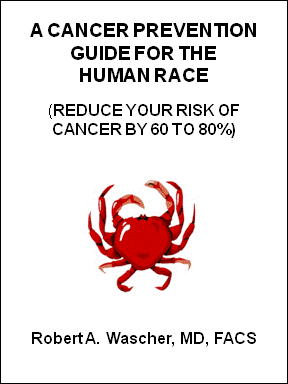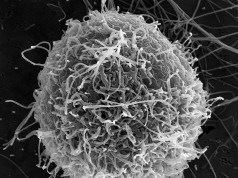By, Robert A. Wascher, MD, FACS
Last Updated: 06/21/2009
The information in this column is intended for informational purposes only, and does not constitute medical advice or recommendations by the author. Please consult with your physician before making any lifestyle or medication changes, or if you have any other concerns regarding your health.
RED YEAST RICE, STATINS & CHOLESTEROL
According to the American Heart Association, more than 50 million Americans require some sort of intervention to prevent or treat coronary artery disease, and another 15 million, or more, require medication in order to lower their cholesterol levels to a safer range.
Today, the statin class of drugs plays a dominant role in the management of elevated cholesterol (hyperlipidemia), and these drugs are widely used to both prevent and treat coronary artery disease when diet and exercise prove inadequate by themselves. While the full spectrum and extent of the health benefits of statin drugs continues to be the subject of debate, there is ample high-level clinical research evidence that statins significantly reduce the risk of clinically significant coronary artery disease, heart attack (myocardial infarction), and death in patients with elevated blood levels of “bad cholesterol” (LDL), and even in patients who have normal LDL levels, but who also have elevated C-reactive protein (CRP) levels. (CRP is a protein that becomes elevated in the blood in the presence of inflammation.)
Unfortunately, as with all medications, the statins are associated with potentially significant side effect. The most serious side effects that have been associated with statin drugs are muscle injury (rhabdomyolysis) and liver injury. Based upon recent research data, approximately 5 percent of patients taking statin drugs will experience significant muscle pain and weakness, requiring that they discontinue their statin medication. In severe cases, rhabdomyolysis can lead to permanent muscle injury and kidney failure. An additional 2 percent of patients may have to stop taking statins due to significant liver toxicity. Joint pain, peripheral nerve injury, and memory loss have also been associated with the use of some statin drugs, although the link between statins and these more uncommon side effects is less clear than for rhabdomyolysis and liver injury.
When diet and exercise alone fail to reduce elevated LDL levels, particularly when there is a personal or family history of cardiovascular disease, statins are generally the first line of treatment (in addition to aspirin, if there are no contraindications to taking aspirin). However, patients who do not tolerate statins have limited choices in terms of effective alternative lipid-lowering therapy.
Niacin, which is one of the oldest forms of therapy for hyperlipidemia, is one alternative option , and although not as effective as statins, this vitamin supplement, when given in high enough doses, can not only reduce LDL cholesterol, but also triglycerides (the predominant form of fat in the blood) as well. Additionally, niacin therapy can also raise the “good cholesterol” (HDL) level in the blood. (By comparison, statins have only small effects on triglyceride levels, and minimal effects on HDL levels in the blood.) The biggest disadvantage of niacin therapy, however, is its tendency to cause severe flushing in about half of patients who take the standard form of this drug, as well as the abdominal pain, nausea and vomiting that occurs in another 8 to 10 percent of patients. However, newer extended-release preparations of niacin are much better tolerated, with an incidence of adverse side effects of approximately 6 to 8 percent. (Fortunately, in most cases, flushing and the other adverse side effects associated with niacin therapy will improve over time if patients continue to take this medication.) As with statin drugs, however, there is a 1 or 2 percent risk of liver toxicity associated with niacin therapy for hyperlipidemia, and most patients who take either statin drugs or niacin for elevated LDL levels should be periodically monitored for elevations of liver enzymes in their blood. Long-term niacin therapy may also increase blood sugar (glucose) levels in patients with pre-diabetes or diabetes, and may also raise blood levels of uric acid, which may, in turn, lead to the development of gout in susceptible individuals. Therefore, fasting blood glucose levels and the level of uric acid in the blood should be monitored, as well, in patients who are taking niacin for hyperlipidemia (these two latter complications of niacin therapy also appear to be less common when taking the newer extended-release niacin preparations.)
Other non-statin therapies are also available for the treatment of elevated LDL and triglyceride levels, but they are seldom used, as they are not only less effective than statins and niacin, but their side effects profiles are so significant that very few patients remain compliant with these alternative lipid-lowering therapies.
Red yeast rice (Monascus purpureus, for you botanists out there), has been used in China for at least 1,200 years. The yeast spores are typically grown on rice, from which this product gains its name. In addition to its use, for centuries, as an herbal medication (mostly in East Asia) for stomach complaints and poor circulation, Chinese food lovers will recognize the brick-red color of red yeast rice whenever they eat Peking duck or char siu.
A handful of small previous research studies have suggested that red yeast rice may be as effective as some statins in reducing LDL and triglyceride levels when taken as a dietary supplement. This is not surprising, as most pure preparations of red yeast rice actually contain naturally-occurring lovastatin, one of the early statin drugs (and which, by the way, was first isolated from aspergillus, which is another form of fungus). However, other compounds contained within red yeast rice are also thought to additively contribute to the claimed LDL-lowering effects of this dietary supplement, above and beyond the contribution of the small amount of lovastatin contained within many of these preparations.
A new prospective, randomized, placebo-controlled clinical research study of red yeast rice strongly suggests that at least some forms of red yeast rice supplements may, indeed, be highly effective in reducing elevated blood levels of LDL in patients who have been unable to tolerate standard statin medications. This study, which appears in the current volume of the Annals of Internal Medicine, randomized 31 patients to receive 1,800 milligrams of red yeast rice twice per day, while the other 31 patients in this study received placebo (sugar) pills that looked identical to the red yeast rice supplement pills. Neither the patients nor the researchers knew which patients were receiving the red yeast rice and which patients were receiving the placebo pills until after the study was completed. All 62 patients were also enrolled in a 12-week lifestyle and dietary modification program for patients with hyperlipidemia.
This study was continued for 24 weeks, and blood levels of LDL, HDL, triglycerides, and liver enzymes were measured at the beginning of the study, as well as 12 weeks and 24 weeks into the study. Additionally, blood levels of creatinine phosphokinase (CPK), a muscle enzyme that is released when statin-induced rhabdomyolysis occurs, were also measured at these same time points. (All of these 62 patients had previously discontinued statin therapy due to muscle pain.)
At the 12-week point, the average LDL levels of the patients in the red yeast rice group had declined by a very significant 43 milligrams per deciliter (mg/dl), compared to the 11 mg/dl reduction obtained in the placebo group with lifestyle and diet modification alone. At the 24-week point, a 35 mg/dl reduction in LDL levels was observed in the red yeast rice group versus a 15 mg/dl average decrease in LDL levels at 24 weeks in the placebo pill group. (It is very important to note, by the way, that even the “placebo group” of hyperlipidemia patients were able to reduce their elevated LDL levels with diet and exercise alone!)
While LDL and total cholesterol levels were significantly reduced in the red yeast rice group, when compared to the patients in the placebo group, blood levels of HDL, triglycerides, liver enzymes, and CPK did not differ between the two groups of patients. Moreover, there were also no significant differences in weight loss or the incidence of muscle pain between the two patient groups following 24 weeks of red yeast rice supplementation.
In summary, this was a small prospective, randomized, placebo-controlled clinical research study involving patients who had previously discontinued statin therapy due to muscle toxicity. In this study, which lasted for a relatively short duration of about 6 months, red yeast rice supplementation (in addition to lifestyle and dietary modifications) significantly reduced blood levels of LDL and total cholesterol. Throughout this research study, there was no clinical or laboratory evidence of liver or muscle toxicity associated with the use of red yeast rice supplements.
The results of this study are highly intriguing, although it does leave some important questions unanswered. In particular, it is not clear to what extent that naturally-occurring lovastatin, contained within in the red yeast rice supplement used in this study, is responsible for the LDL-lowering effects of red yeast rice that were observed in this study (a small previous research study has suggested, but not proven, that the degree of LDL reduction observed with red yeast rice supplementation is greater than what would be predicted by the actual lovastatin content of red yeast rice).
Despite the very intriguing results of this small pilot study, all readers should be reminded of some very important caveats regarding the purchase and use of red yeast rice supplements. Because of the variable but significant lovastatin content of many red yeast rice dietary supplements, the Food and Drug Administration (FDA) has recently sent warning letters to several dietary supplement manufacturers, indicating the Government’s concern that red yeast rice contains a known prescription-only drug and, therefore, that the FDA’s position is that such supplements should probably not be sold as over-the-counter dietary supplements. The variability of lovastatin content in various forms of red yeast rice also makes it difficult for consumers to know how much lovastatin is contained within these supplements, which may be a problem for patients who are predisposed to liver, muscle, or kidney toxicity associated with statin use. Also, because lovastatin, and other potentially active compounds in red yeast rice, can pass into both the placenta and breast milk, women who are pregnant (or who may be pregnant), and women who are breastfeeding, should not be exposed to any supplement or foods that contain red yeast rice. Finally, other compounds that may be toxic to the liver and kidneys have previously been detected in some red yeast rice preparations.
Because of these various health-related concerns, I want to make it very clear that I am not, at this time, advocating the routine use of red yeast rice for medicinal purposes. However, if you have failed all other forms of lifestyle, dietary, and medical therapy for significant hyperlipidemia, then you may wish to forward a link to this column to your Internist or Cardiologist. If they are open to the possibility of incorporating red yeast rice into your lipid-lowering regimen, and they are willing to closely monitor you for signs of toxicity (as well as unexpected pregnancy, for fertile female patients), then this approach may be something that you and your doctor may wish to consider. However, I absolutely do not recommend that you begin taking red yeast rice supplements without the involvement and approval of your physician, because of the health-related safety concerns that I have already discussed.
Finally, I will close out this week’s column by wishing all of you other hard-working dads out there a very happy and warm Fathers Day. Among all of the blessings and fortunes that we might be lucky enough to acquire during our busy and often stressful lives (and especially during these trying times), being a dad, and having the privilege of making such a tremendous difference in the lives of our children, is surely one of the greatest gifts that we can receive. Please remember to try to carve out some special time, everyday, to spend with your children.
Disclaimer: As always, my advice to readers is to seek the advice of your physician before making any significant changes in medications, diet, or level of physical activity
Dr. Wascher is an oncologic surgeon, a professor of surgery, a widely published author, and the Physician-in-Chief for Surgical Oncology at the Kaiser Permanente healthcare system in Orange County, California

(Anticipated Publication Date: March 2010)

Send your feedback to Dr. Wascher at: rwascher@doctorwascher.net
RSS Feed (blog version of this column)
Dr. Wascher’s Biography
Links to Other Health & Wellness Sites
Copyright 2009.
Robert A. Wascher, MD, FACS.
All rights reserved.
Dr. Wascher’s Archives:
6-14-2009: Bone Marrow Stem Cell Transplant & Congestive Heart Failure (CHF)
6-7-2009: Diet, Soy & Breast Cancer Risk
5-31-2009: Diet and Prostate Cancer Risk
5-24-2009: Diabetes, Glucose Control & Death
5-17-2009: Drug Company Marketing & Physician Prescribing Bias
5-10-2009: Hemorrhoids & Surgery
5-03-2009: Statin Drugs & Blood Clots (Thromboembolism)
4-26-2009: Are We Really Losing the War on Cancer?
4-19-2009: Exercise in Middle Age & Risk of Death
4-12-2009: Can Chronic Stress Harm Your Heart?
4-05-2009: Does PSA Testing for Prostate Cancer Save Lives?
3-15-2009: Depression, Stress, Anger & Heart Disease
3-8-2009: Coronary Artery Disease: CABG vs. Stents?; Swimming Lessons & Drowning Risk in Children
3-1-2009: Aspirin & Colorectal Cancer Prevention; Fish Oil & Respiratory Infections in Children
2-22-2009: Health Differences Between Americans & Europeans; Lycopene & Prostate Cancer
2-15-2009: Statin Drugs & Death Rates; Physical Activity, Breast Cancer & Sex Hormones
2-8-2009: Hormone Replacement Therapy (HRT) & Breast Cancer; Stool DNA Testing & Cancer of the Colon & Rectum
1-25-2009: Prostate Cancer, Fatigue & Exercise; Does your Surgeon “Warm-up” Before Surgery?
1-18-2009: Cancer & Vitamins; Teenagers, MySpace and Risky Behaviors
1-11-2009: Exercise Reverses Some Effects of Fatty Meals; Vitamin C and Blood Pressure
1-4-2009: Secondhand Smoke & Heart Attack Risk; Poor Physical Fitness During Childhood & Heart Disease Risk During Adulthood
12-28-2008: Stress & Your Risk of Heart Attack; Vitamin D & the Prevention of Colon & Rectal Polyps
12-21-2008: Breast Cancer Incidence & Hormone Replacement Therapy; Circumcision & the Risk of HPV & HIV Infection
12-14-2008: Vitamin E, Vitamin C and Selenium Do Not Prevent Cancer; Postscript: A Possible Cure for Down’s Syndrome
12-7-2008: Generic vs. Brand-Name Drugs; Stress & Breast Cancer Survival
11-30-2008: A Possible Cure for Down’s Syndrome?; Smoking & Cognitive Decline; Calcium & Vitamin D & Breast Cancer Risk
11-23-2008: Breast Cancer & Fish Oil; Lymphedema after Breast Cancer Treatment; Vasectomy & Prostate Cancer Risk
11-9-2008: Statins Cut Heart Attack Risk Even with Normal Cholesterol Levels; Statins & PSA Level
11-2-2008: Radiation Treatment of Prostate Cancer & Second Cancers; Sexual Content on TV & Teen Pregnancy Risk
10-26-2008: Smoking & Quality of Life
10-19-2008: Agent Orange & Prostate Cancer
10-12-2008: Pomegranate Juice & Prostate Cancer
10-5-2008: Central Obesity & Dementia; Diet, Vitamin D, Calcium, & Colon Cancer
9-28-2008: Publication & Citation Bias in Favor of Industry-Funded Research?
9-21-2008: Does Tylenol® (Acetaminophen) Cause Asthma?
9-14-2008: Arthroscopic Knee Surgery- No Better than Placebo?; A Healthy Lifestyle Prevents Stroke
8-23-2008: Alcohol Abuse Before & After Military Deployment; Running & Age; Running & Your Testicles
3-16-2008: Benefits of a Full Drug Coverage Plan for Medicare Patients?; Parent-Teen Conversations about Sex; Soy (Genistein) & Prostate Cancer
2-23-2008: Universal Healthcare Insurance Study; Glucosamine & Arthritis
2-3-2008: Vitamin D & Cardiovascular Health; Vitamin D & Breast Cancer; Green Tea & Colorectal Cancer
1-12-2008: Statins, Diabetes & Stroke and Obesity; GERD & Esophageal Cancer
12-31-2007: Minority Women, Hormone Replacement Therapy & Breast Cancer; Does Health Insurance Improve Health?





